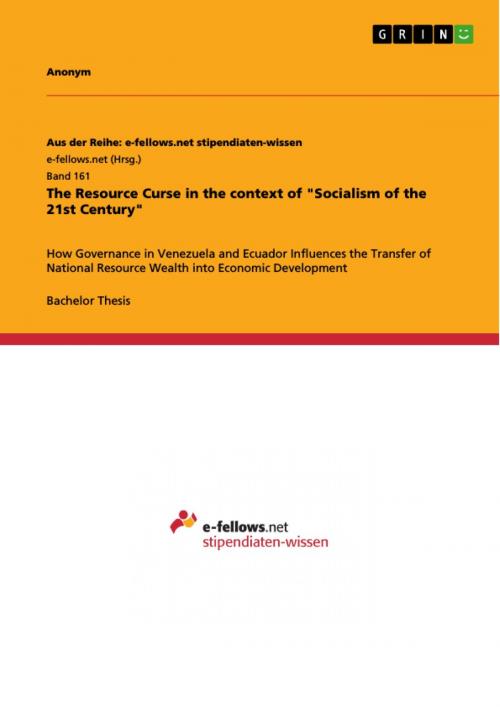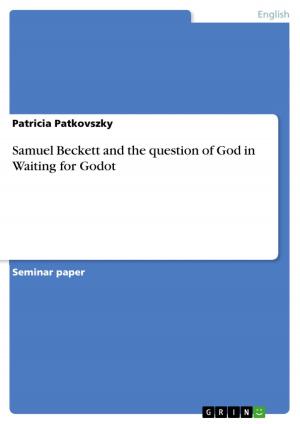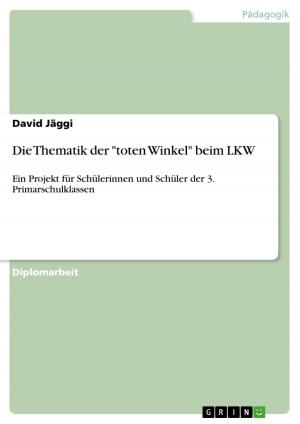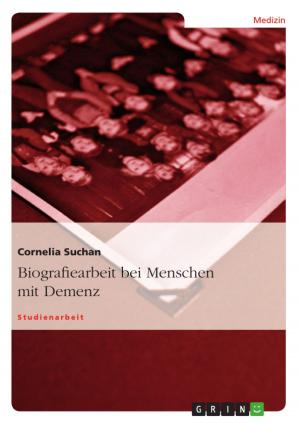The Resource Curse in the context of 'Socialism of the 21st Century'
How Governance in Venezuela and Ecuador Influences the Transfer of National Resource Wealth into Economic Development
Nonfiction, Social & Cultural Studies, Political Science, Politics, Economic Policy| Author: | Anonymous | ISBN: | 9783640975525 |
| Publisher: | GRIN Verlag | Publication: | August 3, 2011 |
| Imprint: | GRIN Verlag | Language: | English |
| Author: | Anonymous |
| ISBN: | 9783640975525 |
| Publisher: | GRIN Verlag |
| Publication: | August 3, 2011 |
| Imprint: | GRIN Verlag |
| Language: | English |
Bachelor Thesis from the year 2010 in the subject Business economics - Economic Policy, grade: 1,33, Jacobs University Bremen gGmbH, language: English, abstract: Ecuador and Venezuela, two Latin American OPEC member states, experienced a socioeconomic upheaval with the windfall petroleum revenues beginning in the 1970s. The oil bonanzas, however, negatively affected the development in the two countries, which show minimal economic growth and political instability throughout the last thirty years. The paradoxical phenomenon can be explained with the resource curse theory. This paper starts with determining the extent of the resource curse and its forms of appearance in both countries. In a second step, it investigates good governance trends in Ecuador and Venezuela in recent years, using the World Bank indicators as guideline. This is done in order to test the hypothesis whether the current left-oriented governments are better able to tame the resource curse with their 'innovative' political ideology. The findings display a downward development in good governance since presidents rule who advocate 'Socialism of the 21st century'. In fact, such an ideology is no remedy to the resource curse but tends to reinforce the negative economic situation, which in return is likely to deteriorate good governance even further. As the results are similar in both countries, one can possibly attribute the described trend to that form of governance in a more generalized manner.
Bachelor Thesis from the year 2010 in the subject Business economics - Economic Policy, grade: 1,33, Jacobs University Bremen gGmbH, language: English, abstract: Ecuador and Venezuela, two Latin American OPEC member states, experienced a socioeconomic upheaval with the windfall petroleum revenues beginning in the 1970s. The oil bonanzas, however, negatively affected the development in the two countries, which show minimal economic growth and political instability throughout the last thirty years. The paradoxical phenomenon can be explained with the resource curse theory. This paper starts with determining the extent of the resource curse and its forms of appearance in both countries. In a second step, it investigates good governance trends in Ecuador and Venezuela in recent years, using the World Bank indicators as guideline. This is done in order to test the hypothesis whether the current left-oriented governments are better able to tame the resource curse with their 'innovative' political ideology. The findings display a downward development in good governance since presidents rule who advocate 'Socialism of the 21st century'. In fact, such an ideology is no remedy to the resource curse but tends to reinforce the negative economic situation, which in return is likely to deteriorate good governance even further. As the results are similar in both countries, one can possibly attribute the described trend to that form of governance in a more generalized manner.















